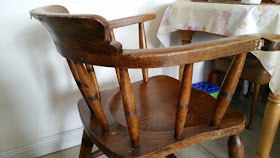Hi Brian,
I took some photos of a nice Irish chair at my Mother-in-Law's house to share with you!
John
----------------------
I really like the simple lines of this chair, and the neat ornamentation on the back. Here is my reply to him:
----------------------
Hi John,
Thanks for these pictures!
There are a couple cool things to note about this chair.
First,
it indeed is a true Windsor chair, i.e. a solid seat plank with
everything else growing from that. The legs and spindles all pierce the
seat, probably with a tapered tenon. I bet it's rock solid.
Second,
the seat plank is made up of a single, wide board as opposed to several
narrower boards glued up to make a wide enough plank. I would guess
that this is an indication that the chair is very old. A newer chair
(especially one that was made for the masses as opposed for the wealthy)
would have used a laminated seat blank. It has been a very long time
since it was more economical to save the labor and use a single seat
blank as opposed to now, when the labor is minimal compared to the
expense of a wide board. I wonder what kind of wood it is? It looks
like the seat could be elm or ash, and the arm bow something else like
maple or sycamore, but really they could be anything.
Third,
the legs (especially the front legs) are more upright and pierce the
seat near the edge - this is very much in the English tradition, as
opposed to the Welsh, and John Brown thinks this makes for a very ugly,
blocky look. Who can say, but it was very popular to do that in certain
regions.
If I had to guess, I would say this chair was
made in a factory. The legs and spindles were all turned on a lathe,
and have very simple ornamentation, indicating this is more of an "everyperson's" chair as opposed to a fancy one intended for the rich.
One
of the neat details of this chair is the shaped cutout on the arms
directly in the back. It makes for a nice look, and simplifies the
lamination of the arm bow somewhat, as the joint doesn't have to be
tight or anything, there is a gap that is clearly intended. The crest
is glued on top and holds everything secure. What a neat shape - very
distinctive and unique.
Note that only the front
posts on the arms actually pierce the arm rail. That is because those
take more stress than the other sticks in the back. Often, these posts
are bigger or shaped different than on other chairs for exactly that
reason. I think it interesting that the others don't pierce the arm
rail. It could be that they are just trapped loose in there and aren't
really providing strength. I would have to examine it in person.
The
wedges on all of the piercings go the same direction - left and right.
That is because the grain of the wood goes fore and aft. The wedge
doesn't work to split the wood, it uses the strength of the grain to
hold the tenon tight.
Also, it is normal in the UK for
Windsor chairs to be finished natural, where in the US this type of chair is
painted more often than not.
Is there a story
with this chair? Does your mother in law know how old it is, or how she came by
it? It would be neat to see the underside of the seat. It also would
be neat to see if there is a maker's mark on it anywhere.
Thanks!
Brian
----------------------
So how about it, dear readers? Is there anything you notice about this chair? I think it is a neat example of a chair that is still in use after who-knows-how-long.





Nice chair. I like this sort of low back style a lot. if June ever makes it to my house, I have some ideas percolating in this style that I am seriously itching to try out. Like most of my ideas, they are things I've not seen before, which could be an indicator that they aren't ideal... but I still feel like I need to try them out.
ReplyDeleteI hadn't noticed the trend in English Windsors to have straight front legs, but now that you mention it, I think that explains a certain oddity I've grappled with..It seems a practical solution, but not right to my eye.
Thanks for the comment, Jeremy! This low back style has grown on me. I used to not like it so much.
DeleteI'd love to see what ideas you have, hurry up and finish your kitchen so you can get back to woodworking!
Interesting and informative post Brian. It was fun to read your review of the chair while looking at the pictures. I take it, you really like chairs, and it shows in your descriptions.
ReplyDeleteWell done.
PS Jeremy, this year every month is a June month :-)
Thanks for the kind words, Robert! You are right, I do like chairs.
DeleteJeremy lives in a different time zone than me, maybe it isn't June there ,yet.